- Clone
- 87G (See other available formats)
- Regulatory Status
- RUO
- Other Names
- Human Leukocyte Antigen-G
- Isotype
- Mouse IgG2a, κ
- Ave. Rating
- Submit a Review
- Product Citations
- publications
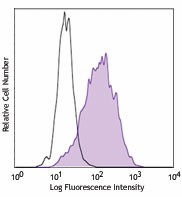
-

Human cytotrophoblastic cell line (JEG-3) was stained with HLA-G (clone 87G) APC (filled histogram) or mouse IgG2a APC isotype control (open histogram).
| Cat # | Size | Price | Quantity Check Availability | Save | ||
|---|---|---|---|---|---|---|
| 335909 | 25 tests | $142 | ||||
| 335910 | 100 tests | $338 | ||||
HLA-G is a nonclassical MHC class I (MHC-Ib) molecule structurally related to MHC class Ia (HLA-A,B, C). There are seven isoforms of this molecule, including membrane bound HLA-G1, -G2, -G3 and -G4 and soluble HLA-G5, -G6, and -G7. HLA-G is primarily expressed on trophoblast cells. Its expression is also found on thymic epithelial cells, cytokine-activated moncytes, macrophages/dendritic cells during viral infection, and in various tumors. HLA-G exerts its inhibitory functions to regulate immune tolerance via interaction with inhibitory receptors ILT2(CD85j), ILT4(CD85d), and KIR2DL4(CD158d), which is expressed on NK cells, T cells, monocytes, dendritic cells, and B cells. HLA-G is also able to bind CD8α/α, which may mediate positive and/or negative selection in thymus.
Product DetailsProduct Details
- Verified Reactivity
- Human
- Reported Reactivity
- African Green, Cynomolgus, Rhesus
- Antibody Type
- Monoclonal
- Host Species
- Mouse
- Immunogen
- HLA-G transfected cells
- Formulation
- Phosphate-buffered solution, pH 7.2, containing 0.09% sodium azide and BSA (origin USA)
- Preparation
- The antibody was purified by affinity chromatography and conjugated with APC under optimal conditions.
- Concentration
- Lot-specific (to obtain lot-specific concentration and expiration, please enter the lot number in our Certificate of Analysis online tool.)
- Storage & Handling
- The antibody solution should be stored undiluted between 2°C and 8°C, and protected from prolonged exposure to light. Do not freeze.
- Application
-
FC - Quality tested
- Recommended Usage
-
Each lot of this antibody is quality control tested by immunofluorescent staining with flow cytometric analysis. For flow cytometric staining, the suggested use of this reagent is 5 µl per million cells in 100 µl staining volume or 5 µl per 100 µl of whole blood.
- Excitation Laser
-
Red Laser (633 nm)
- Application Notes
-
87G mAb reacts with isoforms of HLA-G1 and -G5. Additional reported applications (for the relevant formats) include: restoring HLA-G mediated suppression of allo-T cell proliferation and immunohistochemical staining of frozen tissue sections. Clone 87G is reported not to bind HLA-G in aldehyde fixed samples.4
-
Application References
(PubMed link indicates BioLegend citation) -
- Odum N, et al. 1991. Eur. J. Immunol. 21:2121.
- Lila N, et al. 2001. P. Natl. Acad. Sci. USA 98:12150.
- Lila N, et al. 2002. Circulation. 105:1949.
- Blaschitz A, et al. 2000. Hum. Immunol. 61:1074.
- Balsamo M, et al. 2012. Eur J. Immunol. 42:1833. PubMed
- Product Citations
-
- RRID
-
AB_10900805 (BioLegend Cat. No. 335909)
AB_10900805 (BioLegend Cat. No. 335910)
Antigen Details
- Structure
- Ig
- Distribution
-
Trophoblast cells, thymic epithelial cells, cytokine-activated moncytes, macrophages/dendritic cells during viral infection, various tumors
- Function
- Inhibit NK and T cell-mediated cytolysis and T cell proliferation, induce apoptosis of activated CD8+ T cells, induce Th2 cytokine production
- Ligand/Receptor
- ILT2(CD85j), ILT4(CD85d), KIR2DL4(CD158d), CD8α/α
- Cell Type
- Dendritic cells, Epithelial cells, Macrophages, Monocytes
- Biology Area
- Immunology
- Molecular Family
- MHC Antigens
- Antigen References
-
1. Hunt JS, et al. 2005. FASEB J. 19:681.
2. Carosella ED, et al. 2008. Blood 111:4862. - Gene ID
- 3135 View all products for this Gene ID
- UniProt
- View information about HLA-G on UniProt.org
Related FAQs
Other Formats
View All HLA-G Reagents Request Custom Conjugation| Description | Clone | Applications |
|---|---|---|
| Purified anti-human HLA-G | 87G | FC,ELISA,IHC-F |
| PE anti-human HLA-G | 87G | FC |
| APC anti-human HLA-G | 87G | FC |
| PE/Cyanine7 anti-human HLA-G | 87G | FC |
| Alexa Fluor® 488 anti-human HLA-G | 87G | FC |
| PE/Dazzle™ 594 anti-human HLA-G | 87G | FC |
| Ultra-LEAF™ Purified anti-human HLA-G | 87G | FC,ELISA,IHC-F |
Customers Also Purchased


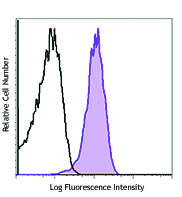
Compare Data Across All Formats
This data display is provided for general comparisons between formats.
Your actual data may vary due to variations in samples, target cells, instruments and their settings, staining conditions, and other factors.
If you need assistance with selecting the best format contact our expert technical support team.
-
Purified anti-human HLA-G
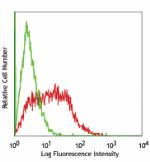
Human cytotrophoblastic cell line (JEG-3) stained with purif... -
PE anti-human HLA-G
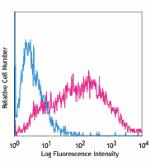
Human cytotrophoblastic cell line (JEG-3) stained with 87G P... -
APC anti-human HLA-G
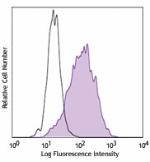
Human cytotrophoblastic cell line (JEG-3) was stained with H... -
PE/Cyanine7 anti-human HLA-G
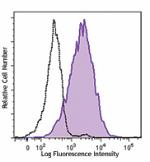
Human cytotrophoblastic cell line (JEG-3) was stained with H... -
Alexa Fluor® 488 anti-human HLA-G
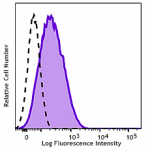
Human cytotrophoblastic cells (JEG-3 cell line) were stained... -
PE/Dazzle™ 594 anti-human HLA-G
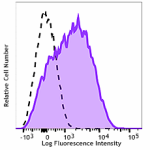
Human cytotrophoblastic cell line (JEG-3) was stained with H... -
Ultra-LEAF™ Purified anti-human HLA-G
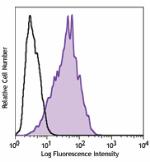
Human cytotrophoblastic cell line, JEG-3 was stained with LE...

 Login/Register
Login/Register 









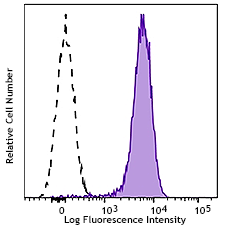



Follow Us